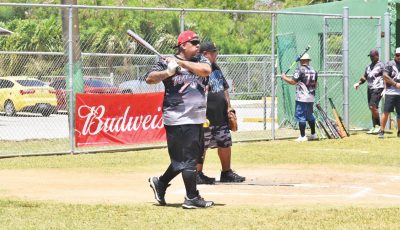PASAI: Advocating for good governance
Given delays in processing financial audits in the Pacific region, the Pacific Association of Supreme Audit Institutions, or PASAI, was in Honiara in September to support the government officials who are responsible for preparing government accounts and for scrutinizing those accounts after they are audited.
Key government officials came together to talk about the role of Members of Parliament in overseeing how public funds are spent and the role of the Public Accounts Committee and the Public Expenditure Committee within the Solomon Islands Parliamentary processes.

Workshop participants, from left, PASAI Advocate Eroni Vatuloka, Speaker to National Parliament Ajilon Nasiu, and PAC Chairman Hon Rick Hou, Acting Auditor General Robert Cohen, Clerk to National Parliament Clezy Rore and Committee secretary staff and members of Parliament. (Contributed Photo)
Eroni Vatuloka facilitated the workshop alongside Acting Auditor-General Robert Cohen. Vatuloka is the newly appointed Advocate for PASAI and came to the Solomon Islands at the invitation of Cohen.
Vatuloka said: “The Office of the Auditor-General is one of a number of integrity agencies that has found it hard to get its recommendations implemented. The intention of the workshop was to establish and then to continue to build a working relationship with the Committees.”
PASAI is able to bring a regional perspective to their workshops, sharing Pacific-wide experiences and circumstances.
Speaker of the National Parliament, Ajilon Nasiu, opened the proceedings, stating: “There is a growing awareness among citizens about the role Parliamentary Committees play on behalf of the people of the Solomon Islands.” This growing awareness may be, in part, due to Chief Justice Albert Palmer declaring in January that the High Court would make corruption one of its priorities for 2015.
The workshop was based around presentations and question-and-answer sessions about PASAI’s forthcoming Accountability and Transparency report, about the different models of Public Accounts Committees and audit office across the Pacific, and how to read the audit opinions.
This was the first Public Accounts Committee workshop that PASAI has run under its new advocacy program and PASAI plans to run more across the Pacific. Key issues raised during discussions included the level of participation of the private sector in the scrutiny of government budgets, whether the Public Accounts Committee should engage civil society and non-government organizations, and independence of the Audit Office.
During the week, Vatuloka also presented to state-owned enterprises and statutory authorities; held meetings with the Permanent Secretary for Finance, Integrity Group Forum, and the Institute of the Solomon Island Accountants; and met with civil society and development partners.
PASAI is the official association of supreme audit institutions (government audit offices and similar organizations, known as SAIs) in the Pacific region. PASAI promotes transparent, accountable, effective, and efficient use of public sector resources in the Pacific. It contributes to that goal by helping its member SAIs improve the quality of public sector auditing in the Pacific to uniformly high standards. PASAI is supported by the Asian Development Bank, the governments of Australia and New Zealand, the International Association of Supreme Audit Institutions Development Initiative, and the World Bank. (PASAI)



























